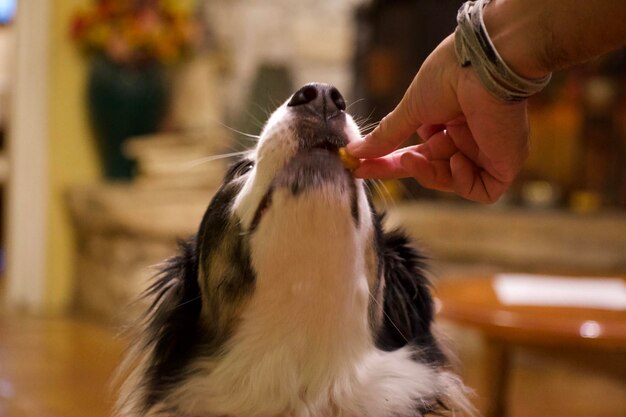Why Is My Puppy Breathing So Fast? Let’s Find Out


Being a dog owner is really special, caring for another living being who doesn’t want anything from you other than love and gives you unconditional love in return. So when they are showing signs of some kind of breathing irregularities, it surely scares us a lot, and rightfully so.
There can be many instances when your puppy breathing heavily or really fast, then you might ask yourself, why is my puppy breathing so fast? To answer that exact question, you need to continue reading this whole article.
Why Is My Puppy Breathing So Fast?

There can be a lot of reasons why your puppy breathing fast than usual; in most cases, there is nothing to worry about there are definitely concerning situations as well. In most cases, the heightened breathing is due to sudden changes in emotions like stress, frightened, and or excitement.
Although there are always health issues that can be the reason why is my puppy breathing so fast. So to classify all the reasons that can cause this reaction in your puppy are listed down below. To ease your mind and to know the exact reason continue to browse through the points stated below.
Reasons For Heavy & Faster Breathing In My Dog
Before you can identify that your dog is breathing faster, you need to know the normal breathing speed of a dog. When your puppy is in a resting position, then the average breath for it should be somewhere around 15 to 35 breaths per minute.
If breathing is higher than this rate, the medical term for that condition is called “tachypnoea.” To check for any signs of fast breathing, notice your puppy’s chest for a few minutes with a watch. Count each breath for about 30 secs and then multiply the number by two, which will give you the exact rate of respiration for your puppy.
1. Thermoregulation

Unlike humans, puppies have a smaller number of sweat glands in the footpads. So to cool down after a good exercise is to pant. This is how they regulate their body temperature. By panting, dogs cool down, and while doing that, moisture evaporates from their nose, lungs, and tongue.
After a few minutes of panting, a puppy usually stops, but if they continue panting, then it can be a sign of heatstroke. You should look for signs like vomiting, seizures, hyperventilating, and collapse to identify heatstrokes. If you suspect heatstroke, then immediately cool your puppy down by moving it to a cooler place, and consult a vet.
2. Excitement

In most cases, if you ask why my puppy breathing so fast, the answer is that they are excited. It is very common for a dog breathing fast when they are excited by something. Meeting new people, running, playing, or doing all sorts of shenanigans make a puppy very excited, and this causes it to breathe faster.
If you are a dog owner, it is very easy for you to know when your puppy is excited or happy. The biggest giveaway is the wagging of the tail, with a relaxed body posture. They will also be making cute noises from their mouth and have their ears relaxed but not attached to their body.
3. Stress & Anxiety

Another very common sign for your puppy breathing fast is if they are stressed or suffering anxiety. They can feel stressed even while sleeping, so if you are wondering why my puppy breathes fast while sleeping, then this can be the reason.
The reason for the stress can be a variety of reasons, from loud noises, coming to a new place, or even fear of certain situations. The signs of your puppy being stressed out due to anxiety can be seen if they tuck their tail, tremble, hiding.
Even certain body postures like flatended ears and hunchback posture can also mean they are stressed. All these reasons can make your make breathe faster than usual, and if you can’t help them, talk to your vet.
4. Respiratory Disease

It is quite normal to think that any type of breathing irregularities is the cause of any respiratory disease. If you are thinking the same, then you are not wrong. There are a lot of respiratory problems or diseases that can cause fast breathing.
You can divide the respiratory system into two parts, lower are the bronchi, lungs, and trachea. While the upper parts are the nasal cavity, nose, larynx, sinuses, and pharynx. A disease in any of these parts can cause the puppy breathing faster while sleeping or awake.
If this respiratory disease continues, then your puppy is prone to develop a respiratory infection. It is great that most life-threatening respiratory diseases can be prevented by a simple vaccination. The obvious signs of respiratory disease in your puppy are low energy, fever, less appetite, nose discharge, and cough.
5. Anemia

For your body cells to operate properly, you need to have an adequate amount of oxygen in your body. This oxygen is carried by the red blood cells from the lungs to the tissues. If your puppy is dealing with anemia, that means it has fewer red blood cells in its body.
That means less amount of oxygen is getting absorbed by the cells. And to compensate for the less amount of oxygen, your puppy is breathing faster and heavier to get more oxygen in. Now there is a number of reasons why your puppy might be suffering from anemia. And they are.
- Infestation of parasites, like fleas, ticks, and also blood-sucking worms.
- Tick-borne diseases, which are known to damage red blood cells.
- Different toxins, such as onions and garlic.
6. Pain

Showing pain is very similar in dogs and humans, but sometimes dogs can behave differently when they are in pain. Most dogs and puppies are known to yelp out of pain and scream when the sore area is touched, but that is not always the case.
They normally limp on a sore leg and hide from showing you what hurts, and their breathing also increases. When this happens, fast breathing is not the most concerning situation, locating and treating the pain is more urgent.
7. Heart Disease

If you think your puppy breathing fast while sleeping and not showing any of the above signs, then maybe it has heart disease. Higher rates of respiration can be a sign of heart disease, that too, congenital heart disease.
This is a type of heart abnormality that occurs in the cardiovascular system from birth. There are other signs to detect congenital heart disease other than faster breathing, like weakness, low energy, coughing, and stunted growth.
These symptoms may vary, but your puppy suffering from congenital heart disease is very rare, and only 1% of dogs are usually affected. But if you suspect any such diseases, contact your vet for a consultation.
8. Allergic reaction or asthma
Just like in babies, allergic reactions or asthma could be dangerous to puppies as well. This might affect their ability to get air or breathe. They might gasp or take short quick breaths if they have somehow managed to get allergies in their airways.
Because of the allergies, the walls in the airways start to swell, which means they might start closing. This could affect the lungs and get inflamed; fluid can also fill the lungs and stop the oxygen from getting to the blood vessels. Look out for signs like:
- Coughing
- Wheezing
- Sudden weakness
- White or blue gums
- Wide open mouth
- Gasping
- Suddenly struggling to breathe
If you find these signs, take your pup to a vet immediately, or it might cause anaphylactic shock.
9. Viruses and infections
Just like you take care of a newborn baby, you have to take care of your pup as well. You have to be particular so their respiratory system does not get attacked by any viruses. Diseases and infections that might make them breathe heavily are:
- Kennel cough
- Leptospirosis
- Lungworm
- Parvovirus
- Bronchitis
- Heartworm
- Bronchopneumonia
- Influenza
- Canine distemper
- Canine coronavirus
You might find your puppy taking shallow breaths in any of these cases. They might have some other symptoms like fever, loss of appetite, and weakness. You have to consult a vet if the pup has got any of these illnesses.
10. Lung disorder
Lung diseases automatically cause respiratory problems. Lung cancer also can cause respiratory issues. But lung cancers are extremely rare in puppies. However, this is more common among older dogs. If your dog is having seizures, that might also fill their lungs with water and increase their heart rate. Other common lung-related issues are related to injury and trauma, such as a puncture in the lung or because of some bruises.
Wrapping Up!
If you are looking for the reason why is my puppy breathing so fast, there can be a wide range of reasons why. Most of the reasons are non-threatening and are quite common. But if you are concerned for the well-being of your puppy, then you can definitely contact your vet.
Read Also:








Leave A Comment